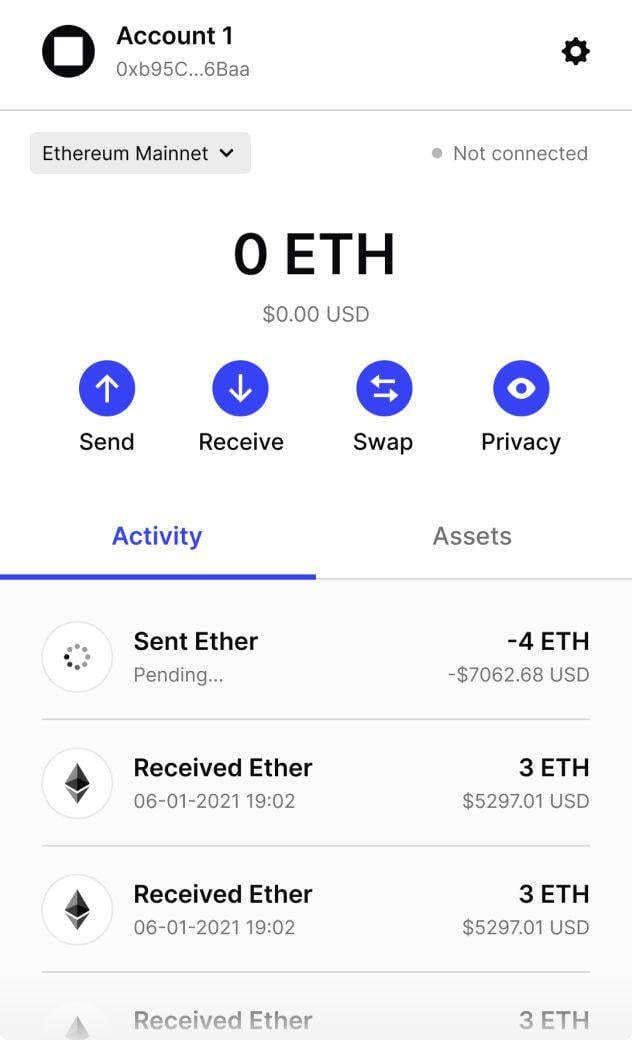A Trusted Exodus Alternative
BlockWallet is an Exodus alternative for Web3 users who want a more robust and decentralized wallet in a familiar and friendly package.
Spot the Difference With our Exodus Web 3 Wallet Alternative
Picking a Web3 wallet can be tough, but don't worry, we've got you covered. Here's some food for thought.
Explore Beyond the Limits of Exodus
If you are more adventurous, BlockWallet offers custom EVM network support, allowing you to freely connect to any Ethereum network. With a built-in Quick Network Finder, it's as simple as searching for a network and adding it. This feature is easy to find, easy to use, and fast.
Bridge Using BlockWallet
With BlockWallet, you can bridge tokens directly inside the wallet, and it only takes a couple of clicks to get started. BlockWallet also makes sure to find you the best quote, looking over multiple protocols to get the lowest price.
BlockWallet has a strict no-tracking policy and includes features like privacy proxies to protect your IP address and other personal data from node providers. In contrast, while Metamask claims not to store wallet account address information for read requests, they do collect both wallet and IP address information for write requests, such as making a transaction. They also retain this data for seven days but delete it after.
Zero Tracking Policy
Worried about privacy? Consider BlockWallet. Designed with privacy at its core, BlockWallet follows a strict zero-tracking policy and takes it a step further by implementing features like privacy proxies to prevent you leaking your IP address and other data.
Trusted Reliability
BlockWallet runs primary and backup nodes for all popular networks, so if one goes down, another one is ready to go. This is called a failover system, and it's the reason why BlockWallet, an Exodus Wallet alternative, feels like the only wallet that works when popular node providers run into issues. Wallets with no failover system in place are at the mercy of their node provider, and so are their users.

Quick-Import Your Account to an Exodus Web3 Wallet Alternative BlockWallet
Your assets live on a blockchain, which means that you can try BlockWallet and keep your current self-custodial wallet at the same time. You can simply import your keys or create a new account.
Compare BlockWallet & Exodus
Still on the fence? Review key differences between BlockWallet and Exodus.
Features

Start on Solid Ground with BlockWallet - an Exodus Wallet Alternative
High Performance
Public nodes are clogged and sluggish. BlockWallet nodes are exclusive, fast and carefully maintained for optimal performance and speed, only available to BlockWallet users.
Identity Protection
Node providers receive your IP and other personal data. BlockWallet protects your identity by intercepting requests, removing sensitive details, and relaying only necessary data for transactions.
Pure Reliability
When node providers stop working, so do the wallets that use them. BlockWallet quickly switches to a backup node provider if the primary stops working, so your transactions.
Frequently Asked Questions
Exodus wallet is a Web3 wallet that supports multiple chains like Ethereum, Polygon, Fantom, Avalanche, and others. Exodus offers many great features with a simple and clean user interface where users can easily send and receive crypto assets. However, when compared to something like BlockWallet, there are some glaring differences. Exodus doesn’t offer custom EVM network support, leaving users stuck with the default networks they offer. They also lack a built-in bridges feature, a tool that’s becoming more and more useful with the emergence of new chains and networks. If privacy is important to you, it’s important to know that Exodus also collects personal user data such as IP addresses, emails, and browsing history. And just as a reminder, BlockWallet doesn’t. BlockWallet actually has a strict zero-tracking policy.
BlockWallet enhances security for users with hardware wallet compatibility. You can easily connect with Ledger or Trezor hardware wallets. Exodus supports Keystone wallet as well, which has QR code scan technology to make verification even more secure. These wallets keep private keys and seed phrases offline, providing extra security for your digital assets and guarding against potential attacks on mobile and desktop devices.
Self-custodial and non-custodial are interchangeable terms, so both are the same.
Technically, no, but even though BlockWallet does not have a mobile app, it is possible to export private keys or seeds to any mobile wallet, allowing users to interact with their stored assets.
Yes, BlockWallet offers built-in bridges - a faster and easier way to move digital assets across multiple networks. This feature is quite rare among other hot wallets.
You can easily access your favorite assets on the following networks: Ethereum, Arbitrum, Optimism, Polygon, BNB Chain, Avalanche, Fantom, Gnosis, and Rootstock. In addition to this list of default networks, BlockWallet offers, you can also add more networks using Quick Network Finder.
A centralized exchange (CEX) is a platform that allows users to buy and sell cryptocurrencies and other assets through a single platform. While centralized exchanges are quite convenient, in terms of security, it's always a better idea to store your crypto portfolio assets on a self-custodial wallet.